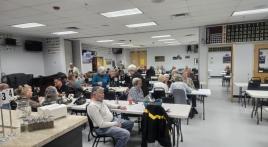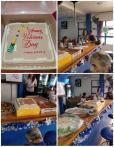They were typical Minnesota boys, the oldest and next-oldest of six children. Their dad was a millwright at a local fiber mill. Their mother was a stay-at-home mom kept busy with the cooking, laundry and required activities in raising a family in a small southwestern community on the Mississippi River.
In the winter they walked to school, and in the summer they could be found on the local ponds swimming, playing hockey in the winter, fishing, trapping and swimming in the Mississippi River.
Those days were much the same all over the United States; then came the Korean War. Raymond (Kip), the oldest of the boys, barely 17, was a bit of a wild child, and the U.S. Army, it was hoped according to the judge in front of whom he appeared more than once, would "grow him up." The next of the brothers, Dick and Harold, also joined the military, Dick in the Air Force and Harold the Army.
Kip was almost immediately sent to Korea, barely finishing his training at Fort Lewis, Wash. It was the dead of winter when his platoon was involved in their first battle with the enemy, and after he was wounded, he and many of the others were taken prisoner by the North Korean army. Because of Kip's disruptive behavior he was moved to several prisoner camps and finally to Camp #5, on the Yellow River. There he spent 32 months, 14 days.
Dick was sent to Korea as well after basic training, was assigned to gunnery training but volunteered for armory school. He made sergeant as an armament squad leader. On occasion he would volunteer as a gunner on the B-24s when the pilots were short of crew members, and flew many missions as such. Harold, the third brother, was sent to Okinawa after basic training as an atomic cannon com-plotter.
In the Korean POW camp treatment of the prisoners was brutal, and the living conditions were deplorable. It was widely known that the reason many of the men survived was due to one man, Sgt. Henry (Hank) Leerkamp. Sgt. Leerkamp became the example and leader of the camp, much to the anger of the Korean guards. It was said by many of those he served with his actions and conduct that he saved many prisoners from "giveupitis" that claimed the lives of many who never came home.
As the war continued most of the bombing runs crewed by Dick were at night; the planes would fly a determined route, drop their bombs and return to base. These were so called lights-out bombing flights since the Korean villages were aware of the bombing flights and went dark.
One night they flew a different route on the return flight. Dick noticed a lighted area below them, it looked like a camp of some sort, lit up and fairly isolated. He asked the pilot since they had bombs on board why not drop them on what they could see? He was told no, it was shown on flight maps as a POW camp which housed American prisoners. It was common knowledge that the North Koreans by design lit up the camps to dare the Americans to bomb them!
Many months later, the conflict ended and Dick and Harold came home. However, Kip was still being held awaiting a prisoner exchange. After many weeks of negotiation, a location for prisoner exchange was determined, and the men were transported to the location of the exchange. Kip and his fellow incorrigibles were placed in a closed van, located away from the main exchange area, time continued and the men were concerned that they were destined not to be repatriated, they began yelling, shaking the van and pounding on the sides. Their cries were heard and the U.S. military ordered the North Koreans to open the doors and free our men! When Kip got back to the States, Dick met him and his friends in San Francisco; needless to say the trip back to Minnesota was subject to many stops along the way to continue to celebrate their freedom.
Many years later, when at a family gathering the conversation turned to war, Dick told the story about the bombing trip including the location of the proposed bombing of the camp ... imagine how he and Kip felt when talking about the location of the camp and the number, it was where Kip was being held!
We are sure there are many stories about the Korean War, and the effect on many of our men and their families. The two younger brothers, Dick and Harold, got out of the military, used their GI Bill to go to college and retired as schoolteachers. The third brother, Phillip, served in the Air Force as an air policeman, who as my husband encouraged me to write this article.
Kip, Master Sergeant Raymond Reed, stayed in the Army, did two tours in Vietnam and sadly died in 1993, as a result of Agent Orange cancer.
Respectfully submitted by Nedra Reed, wife of Phillip Reed, a lifetime member of The American Legion (Post 106, Forks WA, proud sister-in-law of Kip, Dick and Harold Reed, daughter of GL Grant, (deceased) member and former commander of the American Legion post in Manila, Ark.




